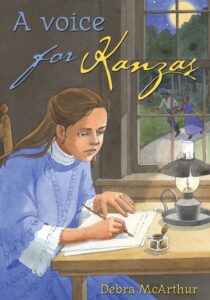
Honors for A Voice for Kanzas
The Best Children’s Books of the Year, 2013; Bankstreet College of Education (ages 9-12, historical fiction category) http://bankstreet.edu/center-childrens-literature/childrens-book-committee/best-books-year/best-books-year-2013/
Kansas Notable Books, 2013; Kansas Center for the Book http://www.kcfb.info/projects/kansas-notable-books.html
(Finalist) Thorpe Menn Award for Literary Excellence, 2013; AAUW Kansas City Branch and Kansas City Public Library
Lucy Catherine Thomkins was looking for poetry when she slipped the booklet from Papa’s coat pocket and discovered Information for Kanzas Immigrants. Just another political paper, nothing a thirteen-year-old poet would be interested in. But before dinner is over that night, Lucy becomes one those immigrants. She feels as out of place in 1855 Kansas Territory as the sky-blue silk gown she has worn for the journey from Pennsylvania, and she seeks her own purpose in this strange place. Papa is committed to the cause of abolitionism, and Mamma is committed to the success of the family’s general store. Even her brother, ten-year-old Joseph, seems to embrace this new life, despite the threats of the Border Ruffians who harass the citizens of Lawrence. When Lucy discovers that her best friend’s family is working with the Underground Railroad, Lucy must make a decision which could have dangerous consequences for herself and her family. She must decide just what she stands for, and she must find her own true voice to express herself in a time and place where a young girl’s voice is seldom valued.
Reviews for A Voice for Kanzas:
“McArthur has created a believable and fast-paced tale of life in the Kansas Territory.” –Kirkus Reviews
“With a smart, courageous lead character…recommended for its well-researched historical content.” —Econ Kids at Rutgers University
“[P]lenty of edge-of-your-seat suspense. McArthur offers a good story that interweaves complex political and dramatic elements.” —Booklist
“Teachers and school librarians should appreciate the talking points raised in this book and its usability in the teaching of American history. [R]eaders who give it a try should enjoy this novel, especially if they enjoy the novels of Ann Rinaldi or Scott O’Dell.” —VOYA
“McArthur aptly and distinctly portrays the racism felt by African Americans and the local Native Americans….McArthur’s novel will appeal those who crave historical fiction or an action-packed story.”–School Library Journal
“This is McArthur’s first novel, and a most impressive one it is.”–Historical Novel Society
